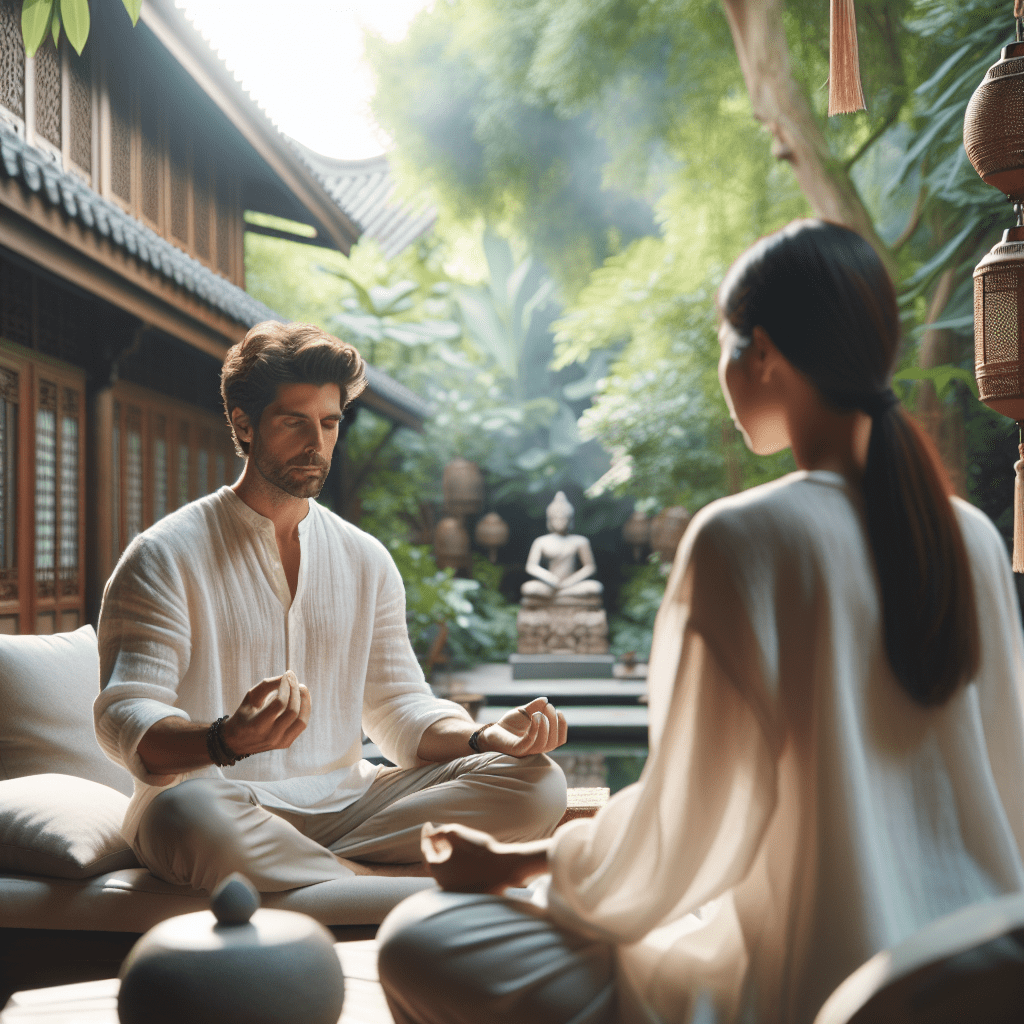In a world where quick fixes and symptom-focused treatments dominate healthcare conversations, a beautiful alternative is blossoming. Holistic health coaching – a practice that honors the whole person rather than isolated symptoms – is gaining tremendous momentum among those seeking deeper, more sustainable paths to wellness.
This isn’t just another health trend. It’s a profound shift in how we approach wellbeing, one that weaves together the golden threads of ancient Eastern wisdom with the practical innovations of modern wellness science. The result? A tapestry of healing that speaks to both our ancestral roots and our contemporary needs.
If you’ve ever felt that conventional healthcare approaches miss something essential about your wellbeing journey, you’re not alone. Many health-conscious individuals are discovering that holistic health coaching offers that missing piece – a bridge between Eastern philosophical traditions that have stood the test of millennia and evidence-based Western approaches that continue to evolve with scientific discovery.
The Heart of Holistic Health Coaching
What makes holistic health coaching so unique in today’s wellness landscape? At its core, this approach recognizes something that Eastern traditions have always known: true health emerges from harmony between mind, body, and spirit. No aspect of our being exists in isolation.
A holistic health coach doesn’t just ask about your physical symptoms or dietary habits. They want to know about your sleep patterns, stress levels, relationships, work environment, spiritual practices, and emotional landscape. This comprehensive approach echoes the Eastern understanding that health is a dynamic balance of interconnected energies.
“In holistic health coaching, we recognize that a headache might stem from poor digestion, which might result from chronic stress, which might be triggered by relationship challenges,” explains Maya Chen, a holistic health coach who integrates Traditional Chinese Medicine principles with modern nutritional science. “Everything is connected in beautiful and sometimes surprising ways.”
Eastern wisdom offers particularly rich resources for holistic health coaches. Meditation practices from Buddhist traditions help clients cultivate present-moment awareness and emotional regulation. Energy concepts like qi (or chi) from Chinese medicine provide frameworks for understanding how vitality flows through the body and where it might be blocked. Ayurvedic constitutional types from India’s ancient medical system offer personalized insights into individual tendencies and imbalances.
When these time-tested approaches are thoughtfully combined with Western understandings of physiology, psychology, and nutrition, the result is truly powerful. A holistic health coach might use both meditation techniques and evidence-based stress reduction protocols, or recommend both adaptogenic herbs from Eastern traditions and vitamin supplements backed by Western research.
Ancient Practices, Modern Applications
The beauty of holistic health coaching lies in its ability to bring ancient wisdom into meaningful conversation with contemporary life. Practices that originated thousands of years ago in monasteries, healing temples, and royal courts now find new expressions in our busy modern world.
Take Qi Gong, for instance – an ancient Chinese energy practice involving gentle movements, breathwork, and meditation. Today’s holistic health coaches adapt these exercises for office workers experiencing tech neck, parents juggling multiple responsibilities, and seniors seeking to maintain mobility and balance.
“What amazes me is how perfectly these ancient practices address our modern ailments,” says James Wilson, who incorporates Qi Gong into his holistic health coaching practice. “The slow, mindful movements create exactly the counterbalance needed to our fast-paced, screen-dominated lifestyles. They bring us back to our bodies when we’ve been living too much in our heads.”
Similarly, yoga – with roots in India’s spiritual traditions – has been adapted by holistic health coaches to address specific modern concerns from anxiety to autoimmune conditions. The emphasis on breath awareness, mindful movement, and inner listening provides an antidote to the disconnection many feel in today’s high-stimulus environment.
We’re witnessing a fascinating cultural shift in healthcare as these ancient methodologies gain scientific validation. Research studies now confirm what Eastern traditions have long claimed: practices like meditation, tai chi, and acupressure points can significantly impact physical health markers, stress hormones, inflammation levels, and even gene expression.
Holistic health coaches stand at the exciting intersection of these converging wisdom streams, translating ancient insights into practical modern applications. They help clients navigate the overwhelming amount of health information available today, creating personalized paths that honor both timeless wisdom and current science.
Transformation Stories: Eastern Wisdom in Action
The true magic of holistic health coaching becomes apparent in the stories of transformation that emerge when ancient wisdom meets modern challenges. Consider the journey of Tara O’Neil, a holistic health coach specializing in women’s wellness who draws deeply from Eastern healing traditions.
One of Tara’s clients, Rebecca, came to her after years of struggling with chronic fatigue, digestive issues, and anxiety. Despite numerous medical tests and prescriptions, her symptoms persisted. Tara’s approach was fundamentally different from what Rebecca had experienced before.
“I looked at Rebecca through the lens of Chinese Five Element Theory,” Tara explains. “I observed imbalances in her Wood element, which governs the liver and is associated with stress, planning, and vision. Rather than just treating symptoms, we addressed the root energetic patterns.”
Tara guided Rebecca through a holistic program that included foods to support liver function according to Eastern nutritional wisdom, a gentle Qi Gong practice designed to move stagnant energy, and mindfulness techniques to transform her relationship with stress. She also incorporated modern nutritional science, suggesting specific nutrients that research showed could support Rebecca’s particular health challenges.
Within three months, Rebecca reported dramatic improvements in her energy, digestion, and emotional wellbeing. “What was most powerful,” Rebecca shares, “was finally feeling understood as a whole person, not just a collection of symptoms. The ancient wisdom Tara shared helped me see patterns in my health I’d never noticed before.”
Another holistic health coach, Michael Chang, integrates Japanese healing traditions with contemporary psychology in his work with executives facing burnout. His client David, a high-achieving technology director, was experiencing insomnia, heart palpitations, and deteriorating relationships due to work stress.
“I introduced David to the Japanese concept of ‘forest bathing’ or shinrin-yoku,” Michael recounts. “This practice of mindfully immersing oneself in nature has been scientifically shown to lower cortisol and blood pressure. We combined this with breathwork from Eastern traditions and modern boundary-setting strategies.”
The results were transformative. David not only recovered his health but discovered a new relationship with success itself. “Eastern wisdom helped me redefine what achievement means,” David reflects. “I learned that true success includes balance, presence, and connection – not just professional accomplishments.”
These stories highlight how holistic health coaches serve as bridges between ancient healing arts and modern wellness needs, creating personalized pathways to transformation that honor both tradition and innovation.
Practical Eastern Wisdom for Modern Life Balance
One of the most valuable gifts holistic health coaching offers is practical applications of Eastern wisdom for navigating our complex modern lives. Let’s explore some key approaches that can help anyone create greater balance and wellbeing:
Morning Rituals: Eastern traditions have long emphasized the importance of how we begin our day. Holistic health coaches often recommend simple morning practices drawn from these traditions – perhaps a few minutes of meditation, gentle stretching, or mindful tea drinking. These rituals set an intentional tone that can transform your entire day.
Mindful Eating: Eastern healing systems view food as medicine and eating as a sacred act. Incorporating this wisdom might mean eating without screens, chewing thoroughly, expressing gratitude before meals, and choosing foods that balance your particular constitution. A holistic health coach might help you identify which foods create harmony in your unique body using principles from Traditional Chinese Medicine or Ayurveda.
Energy Management: Eastern traditions offer sophisticated understandings of personal energy that go beyond Western concepts of “stress management.” Practices like tai chi, meridian stretching, or acupressure can help release energy blockages and restore vitality when applied at key points throughout your day.
Seasonal Living: Many Eastern healing traditions emphasize aligning with natural cycles. A holistic health coach might help you adjust your diet, exercise, and sleep according to seasonal shifts – perhaps suggesting warming foods and earlier bedtimes in winter, or cooling foods and more vigorous exercise in summer.
Cultivating Stillness: Perhaps the most counter-cultural yet essential Eastern practice for modern life is simply creating space for stillness. In a world that prizes constant productivity, the wisdom of deliberate non-doing offers profound medicine. Even five minutes of conscious breathing or meditation can reset your nervous system and restore perspective.
The beauty of working with a holistic health coach is that these ancient practices are tailored to your unique constitution, current circumstances, and health goals. There’s no one-size-fits-all approach, just as Eastern medicine has always recognized the importance of individualized care.
Harmony of Ancient and Modern: The HerbalsZen Approach
The integration of Eastern wisdom with modern wellness innovations exemplifies the philosophy at the heart of HerbalsZen and its groundbreaking EASTCHI AI system. This unique approach demonstrates how 2,000-year-old Eastern medical knowledge can be amplified and personalized through cutting-edge artificial intelligence.
Just as holistic health coaches create bridges between ancient practices and contemporary needs, EASTCHI AI serves as an intelligent guide through the rich landscape of Eastern healing traditions. By analyzing individual constitutional types through the lens of Five Element Theory, the system creates personalized wellness recommendations that honor both time-tested wisdom and modern lifestyles.
This harmonious integration reflects a broader truth that holistic health coaches understand deeply: true wellness emerges when we honor both our ancestral wisdom and our contemporary circumstances. Eastern traditions offer profound insights about the interconnectedness of body, mind, and spirit, while modern approaches provide tools for applying these insights in today’s complex world.
The journey to become a holistic health coach – or to work with one – represents a commitment to this integrated vision of wellness. It’s an acknowledgment that our bodies carry ancient wisdom that, when properly accessed and applied, creates magic in our modern lives.
Whether you’re considering becoming a holistic health coach yourself or seeking guidance from one, you’re participating in a beautiful evolution of healthcare – one that weaves together the golden threads of Eastern philosophy with the practical innovations of contemporary wellness science. In this integration lies the promise of truly personalized, deeply effective pathways to vibrant health and authentic wellbeing.
As the ancient Chinese proverb reminds us, “The journey of a thousand miles begins with a single step.” May your steps on the path of holistic wellness be guided by the best of both Eastern wisdom and modern innovation.


